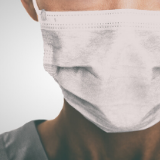
Disclaimer – The coronavirus is a new phenomenon. Insurers and insurance policies are all different. Insurers are taking different stances on coverage and policy wording as this virus continues to spread and cause disruption. Unfortunately, every employer’s situation is unique and their policy response or non-response is unique. This whitepaper is for information purposes only and is designed to help you think of all the areas that can be affected and help understand steps to take to protect your organization, employees, and customers.
IMPACT ON GLOBAL SUPPLY CHAIN
Does the coronavirus have you searching for face masks, disinfectant wipes, or toilet paper? You’re likely seeing empty shelves or purchasing limits wherever you look. In addition to the surge of demand from panicked consumers, many of these items are made in Wuhan, China – the city of origin of the “COVID-19” or coronavirus. In fact, a wide variety of products are mass-produced around this area and are shipped out of Wuhan’s port. This includes everyday items that could impact your business’ supply chain like steel, textiles, chemicals, plastics, manufacturing equipment, and even medical supplies and pharmaceuticals.
If your business relies on products manufactured near Wuhan, you may not see an immediate disruption to your supply chain, as most orders were shipped prior to the Chinese New Year and subsequent manufacturing sector shut down. During the holiday, many workers travel out of town. Paired with the increased number of illnesses, fatalities, and travel bans, the industry saw extreme delays in production after the start of their new year. A shutdown that was originally scheduled to end February 9, and has been postponed for over a month. But the worst is yet to come. The Harvard Business Review predicts that the peak of the impact on global supply chains will occur in mid-March, forcing “thousands of companies to throttle down or temporarily shut assembly and manufacturing plants in the U.S.” and could potentially last for months.
The Chinese government, and other health organizations including the Centers for Disease Control and Prevention (CDC) and World Health Organization (WHO), are still recommending a 14-day isolation of anyone infected by coronavirus, adding another barrier to the production line. If your supply chain relies on small, single-site production facilities, the loss of a key member of the management or ownership team could destroy an operation. Additionally, several air carriers have suspended flights to China until the end of April, which once again could hamper China’s resumption of manufacturing operations.
HOW COULD THIS HURT BUSINESS?
The outbreak of an infectious disease can be devastating, putting human lives, businesses, and economies all at increased risks. While extreme events like this require local and national involvement and preventative planning measures from world health officials, individual organizations are still urged to take precautions to manage potential risk exposures to protect their people and financial interests.
In addition to preparing – and regularly reviewing – crisis management strategies, companies should be aware of how their current insurance coverage would respond to a pandemic and what alternative solutions are available to provide extra protection in the event of an outbreak. Given today’s global economy and complex international supply chain networks, these risks are more prevalent than ever, as is the need to ensure your company is protected from loss.
POTENTIAL INSURANCE GAPS
Coronavirus has companies asking how insurance policies might respond to business income losses as a result of their suppliers or customers who shut down. Companies that rely on materials from China could experience a substantial loss due to the disruption of the supply chain. Plus, the possibility of additional exposures in other countries is another major concern to consider.
Insurance policies vary, but a standard, unendorsed business income policy requires physical loss or damage to insured property by a covered peril to make a claim. Diseases and viruses are not a covered peril. Coronavirus does not fulfill these requirements and therefore there would be no coverage for a pandemic to an insured location.
POSSIBLE SOLUTIONS
Fortunately, there are solutions to fill in coverage gaps or provide additional protection in the case of an epidemic or pandemic event. It is important to point out that since the outbreak, most insurers are taking a stricter stance on providing specific coverage around infectious disease and the coronavirus.
Contingent Business Interruption (CBI) is designed to protect against lost profits due to supply chain disruptions. CBI policies require physical damage at the supplier/customer premises as opposed to at the insured’s. Again, physical damage by a covered peril is required to trigger coverage. Therefore, a standard CBI policy would not respond to suppliers closed due to the coronavirus.
Parametric Insurance closes conventional coverage gaps and provides protection for loss events that were previously deemed uninsurable. Parametric or index-based products are structured to pay out a predefined sum if an agreed, reliable and independently reported trigger is met. Triggers can be customized in various ways, like when death totals caused by a pandemic reach a certain amount, the number of people infected in a limited period or some similar metric. A second qualifying trigger can be added as well, such as a decrease in production, change in price for a commodity or raw material, or another industry-specific index.
Supply Chain Insurance provides Business Interruption (BI) coverage without requiring physical loss or damage. It can extend coverage in the event of a delay or disruption in the receipt of products or services from a supplier. Beyond providing coverage for BI-related to pandemics, supply chain insurance can include coverage for a broad range of events like strikes, civil or military action, political risk, regulatory actions or other significant delays due to events such as natural disasters.
This coverage is particularly valuable for companies with complex supply chains involving domestic or international partners and whose own business is dependent on those suppliers. If your company operates in the manufacturing, automotive, transportation, technology, and pharmaceutical sector, you should seriously consider the added protection of supply chain insurance.
Non-Damage Business Interruption (NDBI), is a specialty insurance product that provides coverage for a defined event unrelated to property damage. Usually, policies allow you to choose events that you wish to have covered. Common triggers can include terrorism, pandemic, strikes, or financial failure of a vendor. However, coverage cannot be purchased following the outbreak, it must be placed prior.
RISK PREVENTION & MANAGEMENT STRATEGIES
Detecting a potential disturbance in your supply chain is the first step in minimizing risk. Preparing and developing a response plan could be critical for your organization in the next coming weeks. As the coronavirus continues to spread and presents new obstacles in the production of goods and services, business leaders will gain insights as to how resilient their supply chains truly are. Having a comprehensive understanding of risk helps to make a leaner operation. Continually auditing and analyzing your supply chain can reveal a variety of potential problems before they happen. By taking a proactive approach, leadership can establish proper backup plans and strategically respond to disruptive events – such as the coronavirus.
The following is a list of suggestions to limit the impact the coronavirus may have on your operation:
- The best way to combat supply chain disruption is to begin now in executing orders with alternative vendors outside of China and other countries that are severely affected, as outlined in your supply chain/business continuity plan. If you have single-source suppliers only, alternative products may be sourced in areas such as Vietnam, Thailand, Malaysia, Mexico, India, or Japan.
- If you have teammates abroad in China or other affected countries, ship them gloves, N-95 masks with exhale valves, and alcohol swabs so they can protect themselves from incidental contact. You can also send paper soap slices, so they can wash their hands anywhere water is offered – which is still considered the best defense against virus transmission.
- Although the virus cannot live outside of humid environments, sanitizing any shipments you receive may give your workforce peace of mind.
- Make sure other vendors you work with are vigilant about sending home employees with coronavirus symptoms and following CDC guidelines.
- Implement travel guidelines and procedures for approving travel to and from China and other affected countries, ask employees in the U.S. to use non-international hubs for domestic travel when possible.
OTHER AREAS OF COVERAGE TO CONSIDER
Event Cancellation Insurance – Some insureds may carry specialized event cancellation coverage. This insurance is typically seen in the sports, entertainment, and event planning industries. This coverage can also be written to include specific insurance coverage against cancellations because of infectious diseases. However, insurers are starting to add endorsements to exclude coronavirus into this coverage. Policies written before the end of 2019 might include this coverage.
Liability Insurance – Policyholders face a risk of liability for failing to protect others from exposure to infection on their premises. Providers of healthcare, transportation, or hospitality services and retail establishments may be vulnerable. Your general liability policies cover liability for bodily injury and property damage, and primary commercial general liability policies will usually provide a legal defense against such claims. Again, insurers are starting to add endorsements to limit or exclude coverage due to coronavirus.
Workers’ Compensation Insurance – Workers’ compensation insurance covers employees who become ill or injured at the workplace. This coverage is based on “work relatedness” and is based on the time the loss occurs, the place where the loss occurs, and the specific nature of the loss. If an employee can show they became infected in the workplace or during work related functions, coverage may be provided.
Environmental / Pollution Insurance – Environmental insurance may provide coverage to include cleanup, disinfection, and decontamination coverage as a result of discharge, dispersal, release, or escape of bacteria and viruses. Under these policies, disinfection expense is specifically defined and coverage is provided for scheduled properties. There also may be other limitations depending on specific policy wording.
Directors & Officers (D&O) / Errors & Omissions (E&O) – D&O and E&O may provide coverage in an instance where companies experience a drop in share price, business value, lack of preparation, policies or procedures. It’s important for companies to develop adequate contingency plans, to observe recommended protocols, and disclosure of risk to exposure performance.
Employment Practices Liability (EPL) – Coverage may also be provided in an instance where an employee or customer feels they have been mistreated due to an employer’s handling of the situation around the coronavirus. Some EPL policies may cover alleged discrimination based on origin and medical status.
HEALTHCARE COVERAGE
Most group health insurers have announced they will be waiving all member cost sharing requirements for testing associated with the COVID-19 virus when prescribed by a health practitioner. They have also encouraged their members to consider taking advantage of the telehealth services available with their plan for consultations with health practitioners if they are concerned they have symptoms associated with the virus.
RECOMMENDATIONS FOR EMPLOYERS
The coronavirus will impact employers differently depending on a variety of factors like employee count, scope of work, and industry. In addition to supply chain managers, every employer should take steps to identify potential points of vulnerability and develop a plan to address. Here are a few more suggestions to protect your workplace against the coronavirus.
- Follow the precautions laid out by the CDC – Educate employees on the signs and symptoms of COVD-19. Encourage anyone who may have been in infected areas to report symptoms quickly and ask them to stay home for 14 days during the incubation and contagious time frame.
- Ask sick employees to stay home. The CDC recommends anyone who has symptoms of acute respiratory illness to stay home until they are free of fever (100.4°F) as well as free of any other symptom for at least 24 hours, without the use of a symptom-altering medicine (like fever-reducers, cough suppressants, etc.).
- Evaluate and ensure flexibility of your company’s sick and PTO policies. Confirm the need for direct communication. Teammates should notify their supervisor and stay home if they are sick. Employers should
permit employees to stay at home to care for sick family members as well. Be aware that more people than usual may need to stay home to handle sick children or family members.
- Management should develop a policy and protocol to address the hazards presented by the coronavirus. Common sense and good personal hygiene should be asserted as part of a positive work culture. Consider providing tissues, hand sanitizer, and no-touch disposal receptacles for your team. Instruct employees to clean their hands with hand sanitizer containing at least 60-95% alcohol, or wash their hands with soap and water for a minimum of 20 seconds.
As we all continue to learn more about the effect of the coronavirus, we recommend employers to integrate a culture of heightened hygiene and safety. Continue to review policies and procedures for possible modifications and flexibility. Refrain from making determinations of risk based on race or country of origin, or any other protected class. Do not make decisions on what you think you know about the virus, symptoms, or conditions without proper verification. Social media is not always the most reliable source of information. And always maintain a strict level of confidentiality with your team, and the information employees share with you, especially when it comes to medical information.
If you have additional questions or need assistance on the topics presented in this article, please contact a member of your Seubert Service Team. Click here to download a copy of this whitepaper. To keep informed on the spread of the virus, the Johns Hopkins Center for Systems Science and Engineering has developed an online dashboard tracking the spread of the coronavirus outbreak, which can be accessed here: http://bit.ly/2In4ygD
Please be advised that this article is an educational and informational resource only. The views and statements are not to be construed as legal advice. Information was sourced from IMA Financial Group, Cipriani & Werner Attorneys at Law, the Centers for Disease Control and Prevention, and the Harvard Business Review.

The Health Benefits of Walking
By boosting physical fitness and enhancing mental well-being, incorporating regular walks into your routine can

Nip Seasonal Allergies in the Bud
The Centers for Disease Control and Prevention reports that one-quarter (25.7%) of adults suffer from

Navigating the Roadmap to a Better Renewal
Trucking companies are navigating complex challenges, prompting a proactive approach to reduce costs and secure



